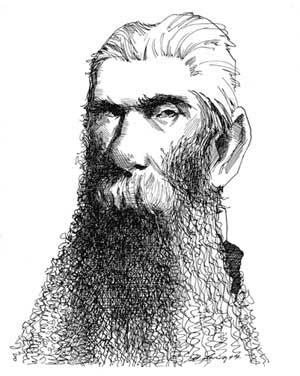First I cry for his departure, then laugh because I’m free
Update for Weiberfasching (especially the links there):
The Nantucket Girls Song
I have made up my mind now to be a Sailors wife,
To have a purse full of money and a very easy life,
For a clever sailor Husband, is so seldom at his home,
That his Wife can spend the dollars, with a will thats all her own,
Then I’ll haste to wed a Sailor, and send him off to sea,
For a life of independence, is the pleasant life for me,
But every now and then I shall like to see his face,
For it always seemes to me to beam with manly grace,
With his brow so nobly open, and his dark and kindly eye,
Oh my heart beats fondly towards him whenever he is nigh,
But when he says; Goodbye my love, I’m off across the sea
First I cry for his departure; Then laugh because I’m free,
Yet I’ll welcome him most gladly, whenever he returnes
And share with him so cheerfully all the money that he earns
For he’s a loveing Husband, though he leads a roving life
And well I know how good it is, to be a Sailors Wife.February 1855 Martha Ford
Bay of Islands, Reefside“The Nantucket Girls Song” is found on on a page toward the end of the diary kept by a Nantucket captain’s [Peter C. Brock] wife, Eliza Brock, during her sojourn at sea aboard the whaleship Lexington from May 1853 to June 1856. In the middle of February 1855, the Lexington was at anchor with four other American ships off the small village of Russell in New Zealand’s Bay of Islands, a minor provisioning stopover for whalers. Eliza Brock went ashore and found two other Nantucket whaling captains’ wives there, both staying with aresident American doctor and his wife, Martha Ford. The Fords made a practice of entertaining American captains and their wives. Eliza Williams stayed with them for ten days in February 1860 and noted in her diary, “The Doctor and his Wife are very kind and social and take a great deal of pains to make it all pleasant for the captains and their wives stopping with them …. The house was full of Ship Masters when we got there.” In 1855, Eliza Brock stayed in Russell for a week and, though she did not much like her boardinghouse, she clearly enjoyed her several visits at the Fords’ amd with the other white women. On February 28, just after her stay on shore concluded, Brock wrote, “I always fell sad and lonely when leaving Port, always leave some dear friends behind who have been kind to me and mine & found many friends at the Bay of Islands; I never expect to see them again, but shall ever cherish their love to me in my memory.” […]
Martha Ford’s [or Eliza Brock’s?] ditty provides a high-spirited and funny (if conflicted) vision of women’s autonomy onshore in the absence of their seafaring men. We can imagine Eliza Brock and the other Nantucket “sister sailors” laughing together in Martha Ford’s parlor, perhaps even composing the lyrics of “The Nantucket Girls Song” together there in the Bay of Islands, so many thousands of miles away from home — and so far away from the very life of which they sang in celebration. When set in the context of Martha Ford’s parlor, the witty insouciance of “The Nantucket Girls Song” seems ironic — and it is even more stunningly so in the context of Brock’s sea diary, where it contributes a jarring note of bravado in her record of unhappiness on shipboard.
With corrected, in case of the Song falsified orthographics cit. from: Lisa Norling: Captain Ahab Had a Wife. New England Women & the Whalefishery 1720–1870,
The University of North Carolina Press, Chapel Hill & London, 2000,
Conclusion: The Nantucket Girls Song, p. 262 f.
Eliza Brock’s journal is owned by the Manuscript Collection of the Nantucket Historical Association. As the latter reports, she had an enviable literary style, and was an accomplished poet. The journal is liberally interspersed with original poetry and essays, mostly of a spiritual or religious nature.
Images: Nantucket Historical Association;
Kay Twomey and Jacques Belasco: The Girl from Nantucket musical poster, 1945 via All Posters;
Captain’s Wives, ca. 1865: unknown photographer. Courtesy of Old Dartmouth Historical Society–New Bedford Whaling Museum (Neg. 2943); from: Lisa Norling, a.a.O.








Leave a comment